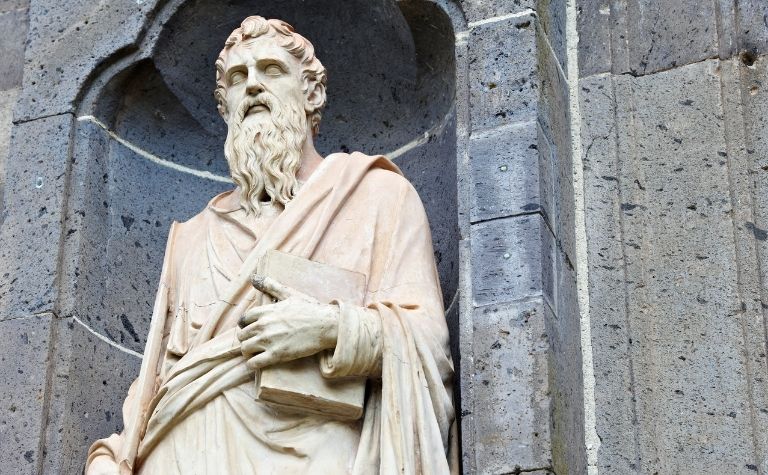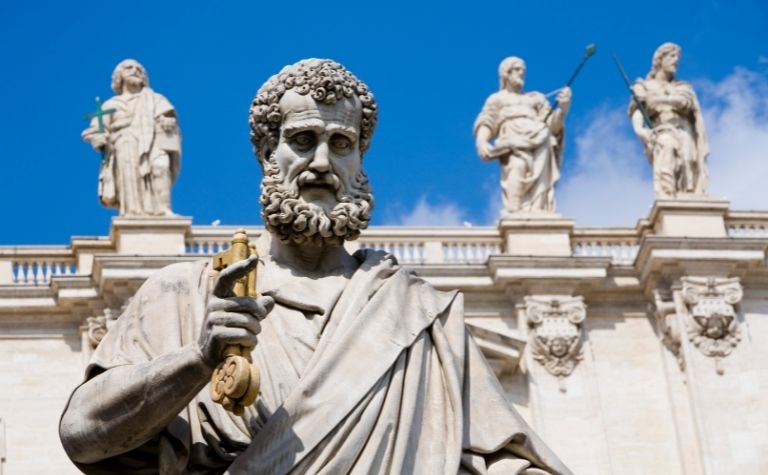Peter is one of the most important figures in the New Testament because of his devotion to Jesus Christ, his bold preaching, and his leadership role as an Apostle in the early church. But like all followers of Jesus, Peter was not sinless, which the Gospels clearly show. Perhaps his most well-known shortcoming was when he denied Jesus three times.
Peter denied Jesus three times because he feared for his safety, knowing that execution was the probable outcome if the authorities seized him. When Peter uttered his three denials, Jesus’ trial was underway, and it was clear that the authorities were treating him unjustly and that death was imminent.
Why do the Gospels record Peter’s denials? Wouldn’t it have been better to keep the sins of one of the early church’s leaders private? Why did Peter deny Jesus three times? What happened after the denials? Was he remorseful? Defensive? Emotional? Keep reading to learn the answers to these questions and others.
Also see Did Jesus Wash Judas’ Feet? to learn more.

Why does the Bible record Peter’s three denials?
All four Gospels record the story of Peter’s three denials. The Gospel of John contains the most information about Jesus’ forgiveness and restoration of Peter. After Jesus ascends into heaven, the book of Acts shows that Peter became a leader in the early church as an Apostle, just as Jesus said he would be.
Sometimes questions like these arise: Wouldn’t it help Christianity to spread if the sins of one of its earliest leaders weren’t codified forever in each of the four Gospels? Isn’t giving so much time and attention to the Church’s “dirty laundry” detrimental to spreading the good news of Jesus?
Why does the Bible devote so much space to the sins of its “heroes”? The Bible doesn’t try to persuade readers that the leaders of Israel in the Old Testament or the Church in the New Testament were perfect and never fell short of God’s moral standards. The sin, shame, and in certain situations, the horrifying aftermath, of their transgressions are told in great detail.
The Old Testament records the faith of people like Noah, Moses, and David, yet people read about their sins, too. The New Testament records the faith of people like Peter but shows readers his shortcomings, too. Unfortunately, Peter’s denials aren’t the only sins of his found in the pages of the Gospels (e.g. John 18:10).
Why do the Gospels record Peter’s shortcomings? First, the Gospels tell readers about Peter’s failures simply because they happened. The Gospels writers prioritized telling readers the truth about people and events as opposed to doctored and sanitized versions that made certain leaders look good. No critic can ever correctly say that the Gospel writers’ purpose was to make the church’s first leaders look good.
Second, knowing that faithful people like Noah, Moses, David, and Peter sinned convinces readers that the only person worthy of their worship is Jesus. Romans 3:23 teaches that “all people sin and fall short of God’s glory” and that includes the “heroes” of the faith. However, Jesus was sinless (e.g. 2 Cor. 5:21).
Also see How Long Was Jesus Christ’s Ministry? to learn more.

Who did Peter deny Jesus to and why?
Matthew explains that Peter’s denials took place in the courtyard of the high priest, which was very close to where Jesus was being tried for his alleged crimes. “And Peter was following [Jesus] at a distance, as far as the courtyard of the high priest, and going inside he sat with the guards to see the end” (Matt. 26:58).
Why was Peter in the courtyard at this time when most of Jesus’ followers were nowhere to be found? Most scholars believe that at this time Peter was still adamant about standing up for Jesus in the face of clear injustice. Some speculate that he may have wanted to free Jesus somehow.
At some point, fear overtook Peter. Rather than successfully resisting fearful feelings, thoughts, and impulses, Peter, unfortunately, gave into them. Rather than relying on God’s strength, he relied on his own “willpower” and his will demonstrated obvious weakness as he succumbed to temptation.
Peter’s first denial
Peter first denied Jesus to a servant girl according to Matthew’s Gospel. Was his fear so great that he couldn’t tell the truth to a girl who, as a servant, had no social or legal influence? The Gospel of Mark explains that she was actually a servant of the high priest, Caiaphas (Mark 14:66), who had Jesus in custody.
Matthew 26:69-70 reads, “Now Peter was sitting outside in the courtyard. And a servant girl came up to him and said, ‘You also were with Jesus the Galilean.’ But he denied it before them all, saying, ‘I do not know what you mean.'”
Also see Was Jesus a Nazirite? to learn more.
Peter’s second denial
Peter denied Jesus a second time to a different servant girl. His denial contained an oath this time, perhaps equivalent to “I promise, I don’t know him.”
Matthew 26: 71-72 reads, “And when he went out to the entrance, another servant girl saw him, and she said to the bystanders, ‘This man was with Jesus of Nazareth.’ And again he denied it with an oath: ‘I do not know the man.'”
Peter’s third denial
About an hour later (cf. Luke 22:59), Peter denied Jesus for a third time to a bystander who detected his northern accent. “After a little while the bystanders came up and said to Peter, ‘Certainly you too are one of them, for your accent betrays you.'” (Matt. 26:73)
Matthew then records that Peter not only denied Jesus but cursed himself. “Then he began to invoke a curse on himself and to swear, ‘I do not know the man.’ And immediately the rooster crowed.” (Matt. 26:74).
The Gospel of Luke adds the haunting detail that at this moment “the Lord turned and looked at Peter” (Luke 22:61). In part, this reveals how physically close Peter was to Jesus when he was in the courtyard.
Remembering Jesus’ prophecy about his denials, Peter “wept bitterly” (Matt. 26:75; cf. Mark 14:72b; Luke 22:62).
Also see What Did Jesus Christ Teach? to learn more.

Did Jesus forgive Peter for denying him?
Most scholars believe that when Peter cried after he denied Jesus for the third time, his emotion was a sign of guilt and shame, but also remorse. Unlike Judas, who showed guilt when he returned the 30 pieces of silver, but then committed suicide, Peter didn’t abandon Jesus after his denials.
After the resurrection, John records that Jesus forgave and restored Peter. In the scene, Jesus asks Peter three times if he loves him. Jesus’ three questions mirror Peter’s three denials.
The first time Jesus asks Peter if he loves him
“When they had finished breakfast, Jesus said to Simon Peter, “Simon, son of John, do you love me more than these?” He said to him, “Yes, Lord; you know that I love you.” He said to him, “Feed my lambs.” (John 21:15)
The second time Jesus asks Peter if he loves him
“He said to him a second time, ‘Simon, son of John, do you love me?’ He said to him, ‘Yes, Lord; you know that I love you.’ He said to him, ‘Tend my sheep.'” (John 21:16)
The third time Jesus asks Peter if he loves him
“He said to him the third time, ‘Simon, son of John, do you love me?’ Peter was grieved because he said to him the third time, ‘Do you love me?’ and he said to him, ‘Lord, you know everything; you know that I love you.’ Jesus said to him, ‘Feed my sheep.'” (John 21:17)
After this, Jesus explains how Peter would die. When he says that people will carry Peter where doesn’t want to go, he means that Peter will die for his relationship with Jesus. What Peter feared in the courtyard would be his fate. Yet in that moment, fear wouldn’t control Peter. Faith would.
“Truly, truly, I say to you, when you were young, you used to dress yourself and walk wherever you wanted, but when you are old, you will stretch out your hands, and another will dress you and carry you where you do not want to go. (This he said to show by what kind of death he was to glorify God.) And after saying this he said to him, ‘Follow me.'” (John 21:18-19)
Also see Why Is Jesus Called the Son of David? to learn more.
Related Articles
Bible scholars agree that the Old Testament includes many prophecies about the person, life, and character of the Messiah, Jesus of Nazareth. Details about Jesus, foretold hundreds and thousands of...
The public ministry of Jesus of Nazareth lasted approximately three years. Matthew, Mark, Luke, and John describe Jesus' miraculous birth and a few stories from his early life like his family's...
